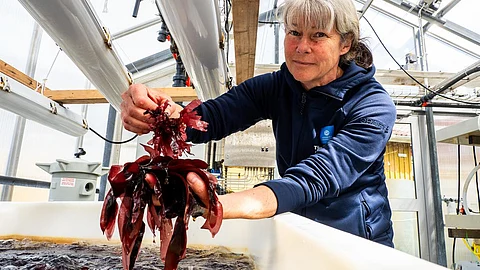

Gunilla Toth, Senior Lecturer at the Department of Marine Sciences, is researching the red algae dulse in the algae house at Tjärnö Marine Laboratory. It’s also called söl in Swedish, and is an algae that can be grown in salty waters on the Swedish west co
Photo: Mikael Andersson
The University of Gothenburg, located on the west coast of Sweden, has published a new study that covers innovations and techniques tailored to the sustainable cultivation of seaweed, which have great potential to thrive in the Nordic country.
Sweden has unique coastal conditions, such as an archipelago that provides shelter from wave exposure on more open coasts and relatively large variations in salinity and temperature. This makes each site ideal for different types of seaweed.
Currently, the brown alga Saccharina latissima, also known as sugar kelp, and the green alga Ulva fenestrata, also known as sea lettuce, are cultivated in the country. One of the strengths of the study is the incorporation of new species.
"We are currently conducting research to develop sustainable cultivation of several different macroalgae species, both those that can be cultivated in salty waters on the west coast, such as dulse, and in brackish waters in the Baltic Sea, such as gutweed," indicated researcher at Department of Marine Sciences Gunilla Toth and who led the study.
Together with researchers from Chalmers University of Technology, the researchers have concluded that increasing the protein content of seaweed leads to more positive outcomes in seaweed aquaculture.
"The most exciting part of our study is the part that summarises how both growth rate and protein content in sea lettuce increase when they are grown in wastewater from the herring industry," explained Toth.
As WeAreAquaculture informed last month, the Seagriculture EU 2025 conference returns for its 14th year, this time taking place in Rotterdam, the Netherlands, from 17 to 19 June. The major annual seaweed industry conference will take place from 17-19 June, focusing on "scaling up and professionalizing the seaweed sector".
